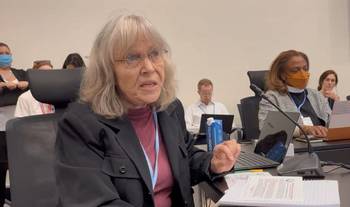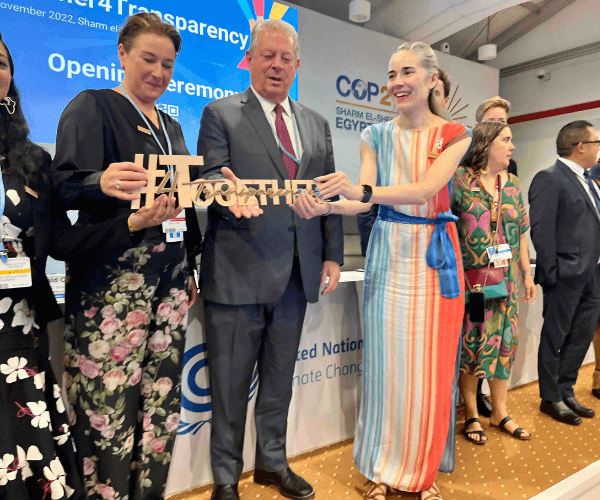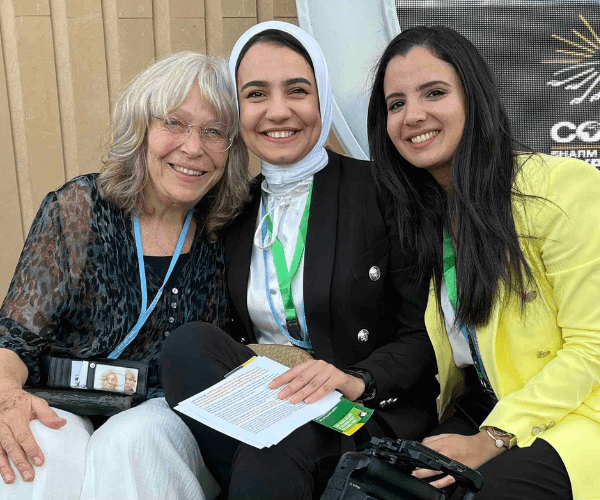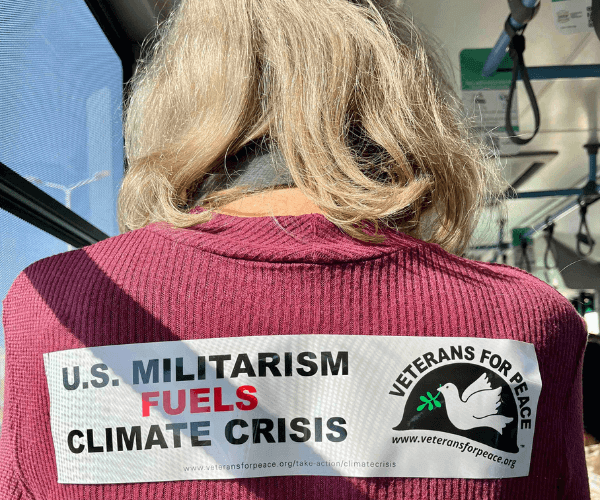
The 30th Conference of Parties on Climate Change (COP30) will be held in Belem, Brazil, from November 10-21. CCMP Steering Committee member Cindy Piester has represented us, in-person or virtually, at this global event for 3 years in a row and plans to follow COP30 closely as well. For more information, please go here: https://unfccc.int/cop30
COP29: Uncertainty in a 1.5 Degrees C, Multi-Polar World
Personal Statement
Overview of COP29
COP 29 seems destined to open under a cloud of uncertainty, particularly as a result of the US presidential election of Donald Trump. He withdrew from the Paris Agreement during his first term and will likely serve, once again, as a notable obstructionist in possibly an even bigger way. All of this is likely to unfold despite desperately needed climate funding and resource sharing. Trump’s mantra of “drill, drill, drill” is certain to reassure the ubiquitous fossil fuel industry, while devastating the weary eyes of diplomats of the Global South and the teary eyes of already doomed Islanders.
COP29 seems destined to abide by an earlier playbook of another nation whose human rights abuses were at the fore as they rounded up and jailed their own activists in the months preceding the COP held in their own country -- because Azerbaijan has just done the same thing.
Will the world again see last year’s ploy by the United Arab Emirates who handed the COP Presidency to Sultan Al Jaber, the former CEO of Abu Dhabi National Oil Company – ADNOC? This year’s COP29 President, Mukhtar Babayev, held multiple positions with the State Oil Company of the Republic of Azerbaijan (SOCAR).
The global climate has worsened considerably with 2023 setting the record for the hottest year in recorded history, as well as the first year that the annual average temperature for the year was 1.5 degrees Celsius above pre industrial times. Also warning us: deteriorating tipping points are contributing to irreversible climate change as you read this.
The Global South is not waiting for climate colonialism to exterminate not only their biodiversity, but themselves as well.
The US as a hegemonic power has utterly failed. This nation’s complicity in Gaza's genocide has cost this nation whatever shreds of decency that once remained. The US may have the most killing toys, but its status as a leader is mired in the concrete burial of nameless innocents. It is a gut-wrenching stench of a loss for the Palestinians and the world. It is also a gut-wrenching loss for the brighter possibilities of our own nation.
The world’s salvation is not in endless war but in common security. The multipolar world being birthed does not offer easy answers, but surely a more just and equitable world is our best hope. It may be that climate disaster will be as nuclear weapons once were, the ultimate deterrence. Maybe as the climate catastrophe becomes unbearable, even the staunchest power-driven madmen will realize that their own skins are on the line and that cooperation is our last and best hope.
The BRICS nations are not yet fully empowered, but they are not backing down. It is a dangerous time, but one that will birth a future that all must live with. While the UN COP process has consistently failed us, the movement that VFP CCMP has participated in is gaining ground here at home, internationally, and at COP.
COP28: Fossil Fuel Interests, Militarism and Wars, Met by Intensifying Resistance
The brazen positioning of Dr. Sultan Al Jaber, the CEO of Abu Dhabi National Oil Company (ADNOC), as the President of the 2023 Convention of the Parties (COP28) by host country the United Arab Emirates (UAE) resulted in global outrage. As rising temperatures and devastating climate impacts have hit communities worldwide, the media is finally getting it.
Global media coverage included a leaked ADNOC document showing that Al Jaber had been expected to use COP to further their business deals, this was followed by Al Jaber’s comment that the science didn’t call for phasing out fossil fuels to meet the 1.5 C goal. Another leaked memo, from the Organization of Petroleum Exporting Countries (OPEC), was intended for delegates from OPEC nations telling them to refuse to sign an agreement that even mentioned the words “fossil fuels.” In the end, though, all of them DID sign such an agreement. Global pressure would have it no other way.
Nonetheless, what we got was a highly flawed agreement with weakened language that ignored the needs of frontline and developing nations. The UN COP process is NOT delivering, as the first ever Global Stocktake made clear. The Loss and Damage fund was finalized, but embarrassingly the US pledged a mere $17.5 million for the fund. The 1.5 C goal was kept, but without the science-based imperatives to support it. There was no support for moving forward with the Paris Agreement's expectation of differentiated needs and differentiated responsibilities, as Alliance Of Small Island States Lead Negotiator, Anne Rasmussen stated. It failed the world and future generations. It was too little too late.
With Gaza under siege and bombardment, some leaders addressed Israel’s attacks on Palestinians. Serbia’s President Vucic asked, “If we are not capable of delivering results in this (wars), how can we be sure to deliver the very best results in climate change issues as well?”
This connection between militarism, wars, and climate has always at the heart of the Climate Crisis and Militarism Program (CCMP), and we are not giving up. Many of our allies played a role at COP28. The Costs of War Project, Tipping Point North South (TPNS), the Conflict and Environment Observatory (COEBs), Transnational Institute (TNI), Scientists for Global Responsibility (SGR), the Women’s International League for Peace and Freedom (WILPF) and others made sure that our shared demands were heard. They report meaningful forward movement towards meeting the goals of our shared agendas.
As never before, the need to address the impacts of militarism and wars on the climate crisis was a message that resonated. Protests calling for Peace for Climate Justice spread the word. In a closing meeting, Michelle Benzing, representing WILPF and the Women and Gender Constituency, asked: “Why is there always money for war, but not for climate?” She was standing just a few feet directly in front of outgoing Climate Envoy John Kerry. Michelle, he heard us through you.
Cindy Piester, Climate Crisis and Militarism Project Steering Committee Member
Women’s International League for Peace and Freedom, Environmental Working Group COP 27 NGO delegate/observer
Official COP 28 Virtual Participant
Please read:
- Revealed: UAE plans huge oil and gas expansion as it hosts UN climate summit
- Rising Resistance and Demands for a Change of Course
VFP Radio Hour with Cindy Piester and Dr. Omar Clay on the Good and Bad of COP 28
COP27:
See a selection of videos from COP27 including speeches by President Biden, UN Secretary General Antonio Guterres, and others

CCMP at COP27: Our Accomplishments
-
Our Steering Committee member (Outreach), Cindy Piester, also representing our ally WILPF, attended COP27, building on the work of VFP member David Collins during COP26. Listen to the podcast with Cindy's insights into what good (some) and not-so-good (a lot) came out of COP27. She handed out and wore (!) our popular bumpersticker and our CCMP brochures, and had many productive conversations with other civil society participants.
- Cindy's work included:
- Networking with other organizations working on climate + militarism nexus, including British-based Conflict and Environment Observatory.
- Building awareness of the relationship between the existential crises of global militarism including the increased threat of nuclear war, and global climate change, including connecting with former Vice President Al Gore, a panel of US Senators, and many activists from all over the world.
- The Real Story about COP 27
Articles by Cindy Piester
Pictured above: Cindy Piester addresses the US State Department at COP27 on issues related to military emissions impact on climate and UNFCCC reporting protocols.
Pictured below: Al Gore at COP27 event, Egyptian Youth Delegates, and Cindy wearing a CCMP bumper sticker.



COP26:
VFP Statement on Results of COP26 - If COP26 is the "last best hope for the world" as Climate Envoy John Kerry stated, the USA is largely responsible for the failure to achieve that "hope." President Biden says the USA is "... leading by the power of our example". The Veterans For Peace Climate Crisis & Militarism Project (CCMP) believes that the USA's poor "example" led to the half-measures achieved at COP26.
- Why should other nations, both USA's friends and foes, prioritize action on climate when the USA spends more in one year on so-called "defense" than the total 10-year funding for climate action proposed in Biden's Build Back Better plan?
- Biden's promised doubling of funds "...by 2024 to $11.4 billion per year to help developing nations deal with climate change," is less than the funds added by Congress to an already bloated FY 2022 military budget.
...CCMP understands the Biden Administration and U.S. Congress cannot pivot from decades of pursuing global military dominance to seriously addressing the climate crisis without political support from the American people. Consequently, going forward we plan to support efforts, such as Congresswoman Barbara Lee's (CA-13) resolution H. Res. 767, which calls for the monitoring and reducing the carbon footprint of the U.S. military. We in CCMP will continue our programs of public education and advocacy, online and in person. By highlighting the emissions of the single largest institutional source of greenhouse gas emissions on the planet, CCMP will enlist allies in support of reprioritizing resources to defend against the real threat to USA's security, the climate crisis.
Read the full statement on COP26 here!
Please read:

